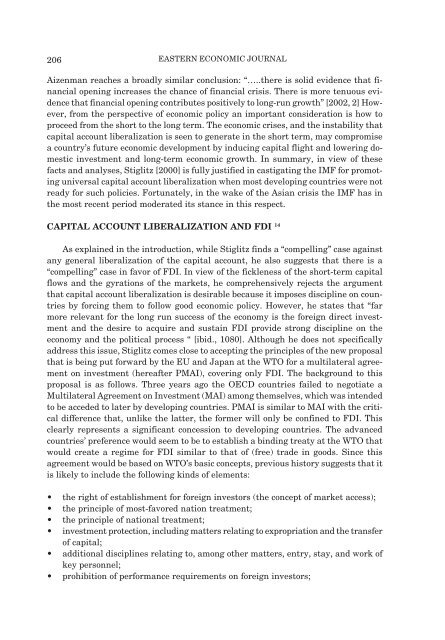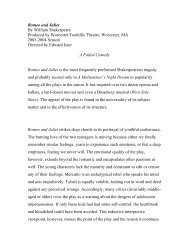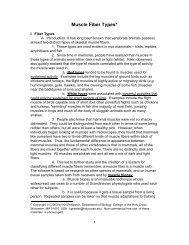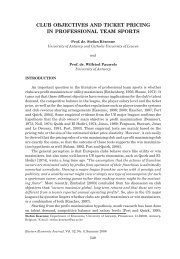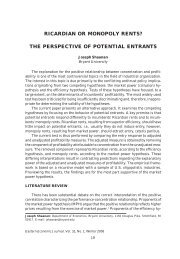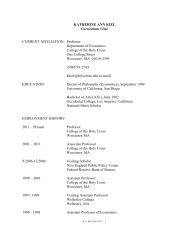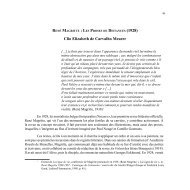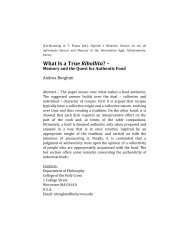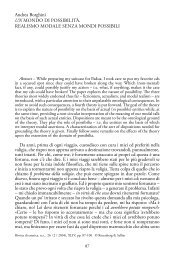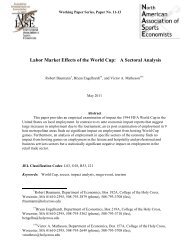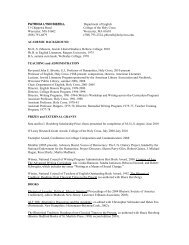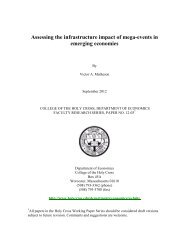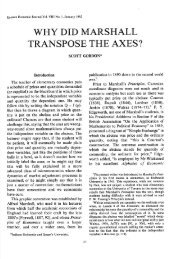29-2 Singh.pmd - College of the Holy Cross
29-2 Singh.pmd - College of the Holy Cross
29-2 Singh.pmd - College of the Holy Cross
Create successful ePaper yourself
Turn your PDF publications into a flip-book with our unique Google optimized e-Paper software.
206<br />
EASTERN ECONOMIC JOURNAL<br />
Aizenman reaches a broadly similar conclusion: “…..<strong>the</strong>re is solid evidence that financial<br />
opening increases <strong>the</strong> chance <strong>of</strong> financial crisis. There is more tenuous evidence<br />
that financial opening contributes positively to long-run growth” [2002, 2] However,<br />
from <strong>the</strong> perspective <strong>of</strong> economic policy an important consideration is how to<br />
proceed from <strong>the</strong> short to <strong>the</strong> long term. The economic crises, and <strong>the</strong> instability that<br />
capital account liberalization is seen to generate in <strong>the</strong> short term, may compromise<br />
a country’s future economic development by inducing capital flight and lowering domestic<br />
investment and long-term economic growth. In summary, in view <strong>of</strong> <strong>the</strong>se<br />
facts and analyses, Stiglitz [2000] is fully justified in castigating <strong>the</strong> IMF for promoting<br />
universal capital account liberalization when most developing countries were not<br />
ready for such policies. Fortunately, in <strong>the</strong> wake <strong>of</strong> <strong>the</strong> Asian crisis <strong>the</strong> IMF has in<br />
<strong>the</strong> most recent period moderated its stance in this respect.<br />
CAPITAL ACCOUNT LIBERALIZATION AND FDI 14<br />
As explained in <strong>the</strong> introduction, while Stiglitz finds a “compelling” case against<br />
any general liberalization <strong>of</strong> <strong>the</strong> capital account, he also suggests that <strong>the</strong>re is a<br />
“compelling” case in favor <strong>of</strong> FDI. In view <strong>of</strong> <strong>the</strong> fickleness <strong>of</strong> <strong>the</strong> short-term capital<br />
flows and <strong>the</strong> gyrations <strong>of</strong> <strong>the</strong> markets, he comprehensively rejects <strong>the</strong> argument<br />
that capital account liberalization is desirable because it imposes discipline on countries<br />
by forcing <strong>the</strong>m to follow good economic policy. However, he states that “far<br />
more relevant for <strong>the</strong> long run success <strong>of</strong> <strong>the</strong> economy is <strong>the</strong> foreign direct investment<br />
and <strong>the</strong> desire to acquire and sustain FDI provide strong discipline on <strong>the</strong><br />
economy and <strong>the</strong> political process “ [ibid., 1080]. Although he does not specifically<br />
address this issue, Stiglitz comes close to accepting <strong>the</strong> principles <strong>of</strong> <strong>the</strong> new proposal<br />
that is being put forward by <strong>the</strong> EU and Japan at <strong>the</strong> WTO for a multilateral agreement<br />
on investment (hereafter PMAI), covering only FDI. The background to this<br />
proposal is as follows. Three years ago <strong>the</strong> OECD countries failed to negotiate a<br />
Multilateral Agreement on Investment (MAI) among <strong>the</strong>mselves, which was intended<br />
to be acceded to later by developing countries. PMAI is similar to MAI with <strong>the</strong> critical<br />
difference that, unlike <strong>the</strong> latter, <strong>the</strong> former will only be confined to FDI. This<br />
clearly represents a significant concession to developing countries. The advanced<br />
countries’ preference would seem to be to establish a binding treaty at <strong>the</strong> WTO that<br />
would create a regime for FDI similar to that <strong>of</strong> (free) trade in goods. Since this<br />
agreement would be based on WTO’s basic concepts, previous history suggests that it<br />
is likely to include <strong>the</strong> following kinds <strong>of</strong> elements:<br />
<strong>the</strong> right <strong>of</strong> establishment for foreign investors (<strong>the</strong> concept <strong>of</strong> market access);<br />
<strong>the</strong> principle <strong>of</strong> most-favored nation treatment;<br />
<strong>the</strong> principle <strong>of</strong> national treatment;<br />
investment protection, including matters relating to expropriation and <strong>the</strong> transfer<br />
<strong>of</strong> capital;<br />
additional disciplines relating to, among o<strong>the</strong>r matters, entry, stay, and work <strong>of</strong><br />
key personnel;<br />
prohibition <strong>of</strong> performance requirements on foreign investors;


